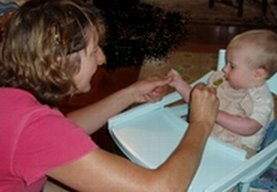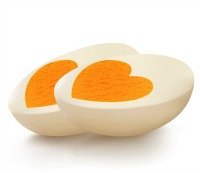Breast Feeding Benefits? Doctors Say
ONLY Mothers Milk for 6 Months for
High IQ no Allergies, Eczema or Asthma
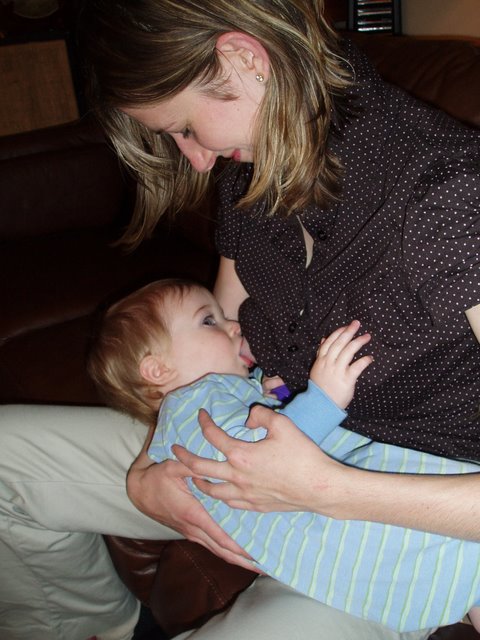
Women should be breast feeding their babies for the first six months without adding any solid foods or formula, say the experts, including the World Health Organization and the Canadian Pediatric Society.
- Best for preventing infant allergies, toddler allergies, asthma and getting healthy kids with a high IQ.
The latest guidelines replace previous advice that moms could add solid foods or formula to their babies' diet along with breastfeeding at four to six months.
Just Breastfeeding for Baby for the first 6 Months?
Here's what the research says about bottle feeding and infant allergies, toddler allergies:
- The longer you breastfeed, the less chance your child has of developing food allergies as well as allergic diseases such as eczema and asthma.

Why?
Breast milk is rich in an immunoglobulin called secretory IGA, which acts as a protective paint, coating the intestines and keeping food allergens out of the bloodstream.
Compared to formula-fed babies, breastfed babies enjoy health benefits such as:
- fewer digestive problems
- fewer ear infections
- fewer allergies
Why? Breast milk contains antibodies that help babies fight off illness.
Exclusive breastfeeding for six months increases the protection against infections that can cause diarrhea.
Why a Higher IQ and Healthy Kids?

When you take the time to nurture your baby with your own milk, you can be happy about these benefits:
- A higher IQ of at least 6.8 points has been related to breast feeding, regardless of the socio economic status, the IQ or the mother and other factors such as birth weight.
Only 10% of breast fed children do not have a higher IQ because they lack a gene that is needed for this effect, according to Dr. Terrie Moffitt, a professor of brain sciences in London, England.
- Breast fed babies are also better off than bottle-fed babies in heart disease risk factors as adults, according to a study presented at the American Heart Association:
The effects are life-long:
Adults who were breast fed had lower BMI (body mass index) on average, and had higher HDL (good) cholesterol than their bottle-fed counterparts.
- Having a higher HDL and lower BMI is considered to protect against cardiovascular disease such as stroke and heart attack.
(N. Parikh of Beth Isreal Deaconess medical Center in Boston)
So, maybe it is worth some "inconvenience" to get your baby off to a good start with no infant allergies or no toddler allergies!
Moms Urged To Breastfeed Longer

Breast feeding also has a bonus for YOU because it protects the mother against future breast cancer.
- Studies have shown that breast milk alone in an infant's first half-year of life confers increased health benefits for a longer period, said Dr. Margaret Boland, chair of the Canadian Pediatric Society's nutrition committee.
"Breast feeding means not having mothers give babies infant cereal at four months, extending the period where the baby's sole source of nutrition is breast milk," says Dr. Boland.
"This excludes formulas and all solids -- cereals, fruits, vegetables, meats, any of the usual infant foods."
- "When you introduce other food into the diet, you change some of the absorption of nutrients that babies get from their food," she explains, saying that cereals are not sterile and may introduce micro-organisms into the infant's system.
The Canadian Pediatric Society now says that along with introducing babies to solid foods no earlier than six months, breast feeding can continue for up to two years and beyond.
Doctors are struggling to get women to extend their duration of breastfeeding, according to Dr. Boland.
- Don't be among the less than 20% of mothers who are now breast feeding for 6 months! Women tend to be bombarded with the commercialization of everything, which says if you're a modern mom, you need to be on the go and use a bottle for your baby.
- Hopefully you will be able to resist pressure from grandparents and friends to give your baby "baby food" too early!
Why Delay Solids against Allergies?
Really? Breast feed for 6 months against allergies?
Why?
- Because mature intestines are better able to screen out potential allergens and keep them from entering the bloodstream.
Even if breast feeding and you feed your infant solid foods (especially those containing protein, such as wheat, soy, and dairy) before the intestinal lining is mature, food allergens can seep into the bloodstream, causing baby to build up antibodies to those allergens and later become allergic to those foods.
- When you do start solids, introduce the least allergic (lowest protein) foods first, such as fruits, vegetables, and rice. Make citrus fruits the last fruits you introduce.
- In the past, experts suggested waiting until at least eighteen months before introducing potentially allergic foods, such as egg whites, tomatoes, shellfish e.g. shrimp, and peanut butter. Most said to delay introducing cow's milk products until at least a year of age.
But the new science for preventing allergies suggests introducing baby solid foods to baby all at once, and not holding back these foods.
By twelve months of age, your child's intestines are mature enough to screen out most of the food allergens, to prevent food allergies.
- New Allergies Treatments: Preventing & Treating a Peanut Butter Allergy
What's Best for Baby?
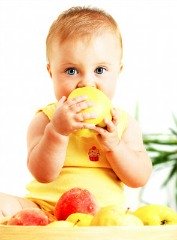
The intestines are the body's filtering system, screening out potentially harmful substances and letting in healthy nutrients.
- In the early months, this filtering system is immature.
As a result, allergens can enter the blood stream, causing the immune system to produce antibodies to that food, thereby creating a food allergy.
Breastfeeding is still best between four and seven months when a baby's intestinal lining goes through a developmental growth spurt called "closure," meaning the intestinal lining becomes more selective about what to let through.
- By six to seven months of age your baby is able to filter out more of the offending allergens to prevent allergies.
You will want to carefully watch if there is a family history of food allergies, and carefully introduce foods to which other family members are allergic.
But be sure to know the latest research about not avoiding foods that cause allergies altogether:
Need Help with Breast Feeding Problems?
During pregnancy there is usually very little focus on breast feeding. We expect it to be natural, which it is, but it is not necessarily easy.
- Many babies don’t “latch” easily or at all, and it is often a learning process for all.
- How do you know you have enough milk? Breast fed babies may even be smaller and may not fit your doctor’s “normal” growth curve, but they are healthier and stronger. If you have problems, don’t give up!
- Get a lactation consultant to help!
Find out from the LA LECHE LEAGUE for nursing mothers if there is a local leader or a support group, or get one of the following books by the experts or by mothers who have gone through it all.
Mothers' Milk Best for Brain, IQ & Early Babies

Children who were breastfed as babies had higher scores on tests of VOCABULARY and REASONING at age FIVE, than those who were NOT breast fed.
- A British study found that breastfeeding seemed to make the biggest difference for babies who were born early and therefore had more catching up to do in their BRAIN DEVELOPMENT.
Amanda Sacker, one of the authors of the study from the Institute for Social and Economic Research at the University of Essex, England, suggests the following:
- "there are essential fatty acids in breast milk which are good for cell development and brain development in particular."
Or, "there could be differences in hormones and growth factors which are lacking in formula."
The study accounted for differences in moms education and income.
(published in The Journal of Pediatrics)
How Substance Abuse Affects Breastfeeding
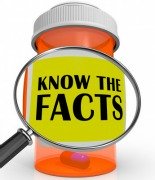 Which legal and illegal drugs affect your baby when nursing?
Which legal and illegal drugs affect your baby when nursing?Both prescription drugs and street drugs will affect your baby while breast feeding!
Before you begin nursing, you will want to increase your awareness of the effects of the following on your baby:
- caffeine
- alcohol
- nicotine
- marijuana
- opiates
- stimulants
Be aware of anything you are taking that might harm your baby. These can be both legal and illegal.
Baby Eczema Food Allergy Help
We hope that you will be able to treat yourself and your baby to 6 months of special nourishing and bonding!
Breast feeding benefits for baby's brain, IQ and helps avoid toddler allergies -- and a baby eczema food allergy and even against a peanut oil allergy.
What about introducing solid foods to baby?
- SEE the new baby solid food guide to help prevent a baby eczema food allergy
- A life without eczema, asthma, infant allergies, toddler allergies or a peanut butter allergy is certainly worth the effort!
SEE ALSO:
GO TO Health Discoveries HOME PAGE from Breast Feeding against baby eczema food allergy and Asthma
Recent Articles
-
Natural Blood Pressure Supplement Backed by Science
Apr 13, 24 04:10 PM
Try a natural blood pressure supplement for lowering blood pressure without life long medications. -
Scientists find a Natural Treatment for Parkinsons Disease
Apr 04, 22 10:18 PM
A new treatment for Parkinsons disease? Parkinson's disease is a neuro-degenerative disorder for which no neuro-restorative therapeutic treatment is currently available. The medications typically used… -
Amazon’s Best Beauty Products?
Mar 25, 22 12:00 AM
Finding which beauty product is best for your health has just become easier. Did you know that in 2022 Amazon created the Amazon AWARE line of beauty products that are EWG VERIFIED? This stamp of appr…
